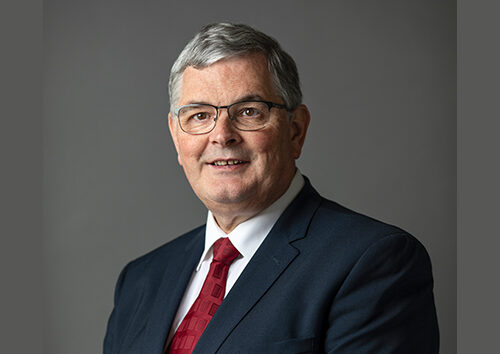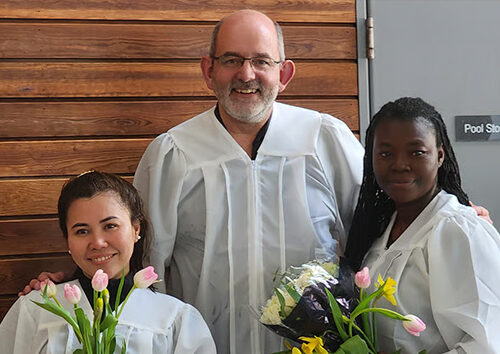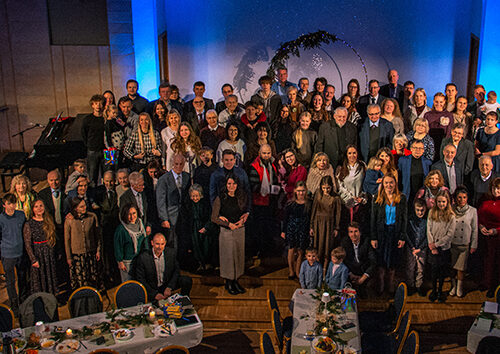25 November 2020 I Binfield, UK [Michael and Helen Pearson]
For its final lecture of 2020, the Newbold Diversity Centre was delighted to welcome Amanda Khozi Mukwashi, the CEO of Christian Aid, on Tuesday, 10th November. The fact that she so clearly identifies as a Seventh-day Adventist added an extra dimension to the event. She framed her topic as a question: ‘Does poverty have a colour?’
The subtitle added an extra dimension to her subject: ‘How the Church can restore dignity, justice and equality for all’. As she surveyed the Church universal and her own Adventist community, her answer to her own question was a resounding ‘yes’.
 Though she has only been in her current post for two years, Amanda has 25 years of experience in relief and humanitarian aid organisations like the United Nations and Voluntary Service Overseas. She has seen poverty and its devastating effects at close quarters. Part of the power of her lecture was her stories about places and people that she had visited in the course of her work. She opened with an account of her work with a women’s group in Ethiopia, a country which has witnessed drought more and more frequently in recent years. Vast areas have become infertile and people’s lives have been put at severe risk.
Though she has only been in her current post for two years, Amanda has 25 years of experience in relief and humanitarian aid organisations like the United Nations and Voluntary Service Overseas. She has seen poverty and its devastating effects at close quarters. Part of the power of her lecture was her stories about places and people that she had visited in the course of her work. She opened with an account of her work with a women’s group in Ethiopia, a country which has witnessed drought more and more frequently in recent years. Vast areas have become infertile and people’s lives have been put at severe risk.
She pointed out that the primary driver of much poverty in this case and many others is climate change, which has disrupted centuries-old cultural patterns and ways of survival. While people in the West debate the causes of climate change, millions elsewhere feel it in their stomachs. “Those who suffer the worst consequences of environmental disaster are those outside the developed areas,” said Mukwashi. Those who are the greatest culprits when it comes to carbon emissions – the USA, Europe, Russia, China – experience the least impact on their daily life.
Everywhere Black / Asian / Minority Ethnic people are ‘at the bottom of the food chain’ and living in extreme poverty around the world. In the UK, children of colour are more likely to be in care and less likely to be legally adopted. Where ethnicity intersects with gender women of colour will find themselves most disadvantaged.
The reasons for all of this are of course complex. But it is clear that an economic system based on slavery which has evolved and continues to evolve into a particular sort of capitalism is a primary cause of inequalities and injustice. The UK is by no means blameless in these matters. For example, it is extraordinary to discover that it was only in 2015 that the UK government finished paying off compensation to slave owners, and that with the monies of tax-payers who are themselves the descendants of victims.
So – to the big question of the lecture: ‘Where does the church stand on these issues and others like them?’
It is important that the Christian church confesses its deep complicity in the slave trade. ‘The church was not only actively involved and engaged in grading black Africans as sub-human’ said Mukwashi. ‘It provided a rationale and gave permission for people to do so.’ The church has slowly changed its view, but there is still much to be done in the business of restoration.
When it comes to developing dignity, love, justice and equality in the world, the church continues to do much to support the status quo. Its own structures replicate power structures and financial structures which are little different from their secular counterparts. The church still operates with hierarchical, male-dominated power structures. It still invests members’ money in enterprises which use large quantities of fossil fuels.
Mukwashi testified that she had become an Adventist while at university largely because of Adventist teaching on holistic human living. But, she observed, “Adventists are not looking holistically at the business of production and consumption.” If the role of the Church is to restore dignity to all human life it cannot continue as it is. It must redouble its efforts on behalf of the poor, it must work towards greener economies, must grow towards true gender equality. These matters are all intertwined – they are all about justice. The Church will lose, is losing, its moral capital. It must engage with such issues.
Most of all we can individually be models of inclusiveness, people who are quick to welcome and slow to exclude. God has dignified us so we must bring dignity to others. And poverty is one of the great destroyers of dignity. So many of the causes of inequality and poverty are beyond the reach of individuals, but Mukwashi advised us to play a part locally. We can increase our charitable donations of course. We can write to our MP. We can keep going to church to keep alive the sense of the dignity of the individual. We can talk more than we do about poverty, dignity, and equality from the pulpit and in Bible study groups without being party-political. We can review the way we as families and as a church spend our disposable income. We can lend our weight to groups which lobby for greater social justice in our world.
To conclude the lecture and the Q&A session which followed, Mukwashi left her online audience with a number of challenging questions to the Church universal and the Adventist church in particular. ‘How would Jesus relate to the way we invest and in what we invest?’ ‘Are we using the power and influence we have to change things? What is the role of the Church in restoring sacredness to human life?’ If the Church remains silent on these issues, then what is the role of the Church? We talk about redemption, love and compassion but is the world experiencing love and compassion through us?’
The lecture’s title question was answered – and more: ‘Does poverty have a colour?’ Yes, it is black and brown. Is the church in the business of ‘restoring dignity, equality and justice to all’? Yes, but it has its blind spots. Our job is to be as clear-sighted as possible about what those failures might be.’
If we keep listening to the voice of Amanda Khozi Mukwashi and others like her, maybe our eyesight will improve!
This lecture can be viewed on the Newbold College of Higher Education Facebook page here.
Amanda Khozi Mukwashi has recently published a book about identity, humanhood and hope But where are you really from? (SPCK)
tedNEWS Staff: Victor Hulbert, editor; Deana Stojković, associate editor
119 St Peter’s Street, St Albans, Herts, AL1 3EY, England
E-mail: [email protected]
Website: www.ted.adventist.org
tedNEWS is an information bulletin issued by the communication department of the Seventh-day Adventist Church in the Trans-European Division. Readers are free to republish or share this article with appropriate credit including an active hyperlink to the original article.



